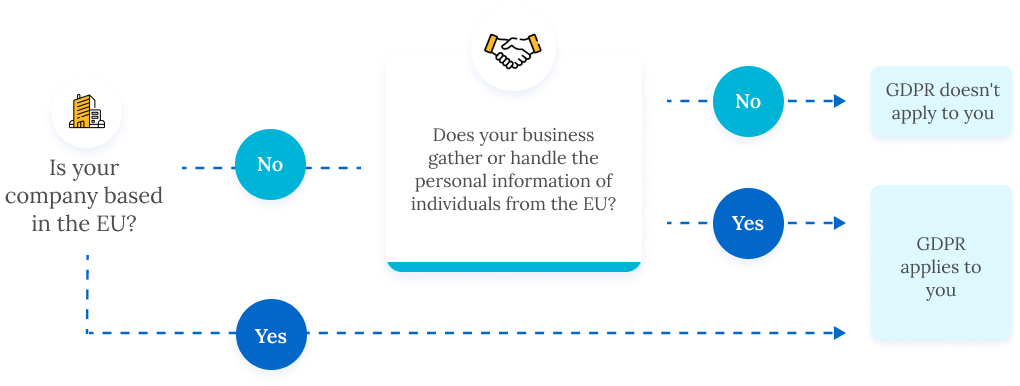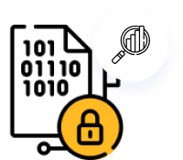Achieve and Maintain GDPR Compliance With PureDome
Easily uphold EU privacy and security standards with PureDome. Our solutions ensure you meet these requirements effortlessly, making it easy to become GDPR compliant.
.png?width=711&name=Group%201321314877%20(1).png)
What is the General Data Protection Regulation (GDPR)?
.png)
The General Data Protection Regulation (GDPR) is a law from the European Union (EU) that regulates how organizations within the EU and beyond manage the personal data of EU residents. It regulates the transfer of personal data beyond the EU borders and seeks to empower citizens and residents by restoring control over their personal information. GDPR enforces strict guidelines on collecting, processing, and storing personal data.
GDPR specifies personal data as any information that can identify an individual, including both direct and indirect identifiers. Direct identifiers include unique data points such as names or credit card numbers. In contrast, indirect identifiers can consist of characteristics like physical traits and dates of birth that, while not unique, can still identify someone.
Within the GDPR framework, a data subject refers to the individual associated with a particular piece of data. For instance, if a company gathers email addresses, the individuals owning those addresses are considered the data subjects.
While GDPR originates from Europe, its implications extend globally. It applies to any organization that collects or utilizes the personal data of EU residents, regardless of their location.
Who Does GDPR Apply To?

GDPR is applicable to any organization, regardless of where it is based, that handles the personal data of EU residents. This includes businesses, non-profits, and public authorities handling data related to EU individuals. Organizations that provide goods/services to EU residents or track their behavior are also required to adhere to GDPR.
Principles of GDPR

Lawfulness, Fairness, and Transparency

Purpose Limitation
.png?width=90&height=90&name=Group%201321314851%20(1).png)
Data Minimization

Data Accuracy

Storage Limitation

Integrity and Confidentiality

Accountability
How PureDome Helps You Achieve GDPR Compliance?
Identity Verification
PureDome's Zero Trust model requires continuous verification of user identities. Our solution ensures that only authorized individuals have access to sensitive data by using multifactor authentication (MFA) and role-based access control (RBAC). This ensures compliance with GDPR and data security.

Least Privilege Access
Our solutions uphold the principle of least privilege, granting users access to the data essential for their roles. This approach reduces the likelihood of unauthorized data access.

Data Encryption and Anonymization
We use advanced encryption methods to safeguard data in transit and at rest. Anonymization techniques further safeguard personal information, making it unreadable to unauthorized users.

Continuous Monitoring
PureDome offers real-time monitoring and threat detection, allowing for the quick identification and resolution of any suspicious activities. Our continuous monitoring helps you stay ahead of potential compliance issues. This monitoring is critical to ensure GDPR compliance.

Comprehensive Reporting
Our detailed reporting tools provide insights into data access and usage patterns. These reports are critical for demonstrating compliance with GDPR requirements and for internal audits.

Need a cybersecurity solution that supports your GDPR compliance journey?
.png?width=527&height=478&name=image%20(82).png)
Frequently Asked Questions (FAQs)
What constitutes personal data under GDPR?
Personal data refers to any information about an identified or identifiable individual, including names, addresses, email addresses, IP addresses, and more.
What rights do individuals have under GDPR?
Individuals have several rights under GDPR, including the right to access, rectify, erase, restrict processing, and object to the processing of their data. They also have the right to data portability.
How does GDPR impact data transfer outside the EU?
GDPR limits the transfer of personal data outside the EU unless the receiving country provides adequate data protection or other safeguards are in place.
What is the role of encryption in GDPR compliance?
Encryption is a critical tool for GDPR compliance, as it protects personal data from unauthorized access, particularly during data transfer or storage. GDPR encourages the use of encryption to enhance data security.
How does GDPR affect third-party data processors?
Organizations must ensure that third-party processors comply with GDPR by including specific contractual obligations in their agreements, such as data protection measures and rights to audit.
How can PureDome help with GDPR compliance?
PureDome offers secure and compliant connectivity solutions, including secure data transfer, access management, and encryption, to help organizations safeguard personal data and meet GDPR requirements.